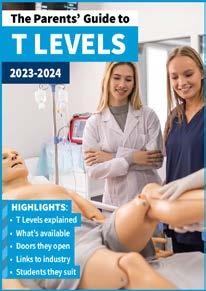Apprenticeships
HIGHLIGHTS:
• Covers all entry levels - from 2 to 7
• How to apply
• Getting interview ready
• Degree apprenticeships
• Where apprenticeships lead




The Parents’ Guide to Apprenticeships 2023-2024
How to get the most out of this guide
Terms of use
This guide has been produced by The Parents’ Guide to and is licensed to Glyn School to share with parents and others connected with them throughout the 2023/2024 academic year. Click here to learn more.
Wherever we refer to ‘parents’ we mean ‘parents and carers’. This includes grandparents, older siblings or any other person with significant caring responsibilities for children.
Contact
Email:
info@theparentsguideto.com
Follow us on :
Twitter: @Parentsguideto
Facebook: @Theparentsguideto
Instagram: @Theparentsguideto
Subscribe:
www.theparentsguideto.co.uk/join-us
► Useful links
If you want to delve deeper and find out more, we’ve included useful links to other reliable sources. Simply click on the picture icons to be taken to our recommended websites.
► Interactive
To make moving around this guide easier, the contents and chapter headings are interactive. Simply click on a heading to be taken to the chapter or page you would like to read.
► Call out boxes
Information we think is particularly important has been highlighted throughout this guide; pay special attention to these!
► Summaries
To help save you time, we have provided useful summaries at the end of each chapter containing the key points.
► Key terms
Easy to understand definitions are provided throughout this guide in the key terms boxes. Don’t let tricky terminology stop you from supporting your child.
► Case studies
Real-life examples give you a chance to hear directly from teens, parents, and teachers about their experiences.
This guide does not need to be read sequentially – browse what interests you most.




FINDING THE RIGHT APPRENTICESHIP




Apprenticeships offer the opportunity to combine study with paid employment

Introduction
Apprenticeships offer the opportunity to combine study with paid employment resulting in a professional qualification. There are no tuition fees, the salary can cover living expenses and apprentices gain first-hand experience of the workplace. If you know more about the university route to careers rather than the apprenticeship route, don’t let this sway you towards considering apprenticeships as a second-rate option rather than a first-choice career plan for your teen.
Apprenticeships used to be associated with trade industries (such as electricians, mechanics or plumbers). Nowadays, apprenticeships can be taken in a wide range of industry sectors and provide entry to all types of careers, including accounting, banking, IT, law, management and television. Relatively new to the apprenticeship suite are “degree apprenticeships”, offering an “earn while you learn” route to BSc or BA status. In other words, the end qualification is the same as if your child had attended university full time, the difference is that they will not have incurred any debt in tuition fees and

will finish their degree with robust and transferable workplace skills.
There are also options to take short term apprenticeships. If your teen isn’t comfortable with committing to several years of further study, they can take one or two year options and still gain recognised, valuable qualifications. Better still, if they change their mind and decide they wish to extend the apprenticeship to gain higher level qualifications, this is often possible.
Taking an apprenticeship is not an easy option and competition can be fierce. It takes organisation and dedication to balance work, where your child will be expected to contribute to the same standards as everyone else, and study. Holidays are far fewer than at college or university. However, if they learn more easily through practical application, the work based nature of apprenticeships will suit them well and they will obtain valuable experience which will strengthen opportunities in finding rewarding work when the apprenticeship is over.


Providing the information you need
With different levels, qualifications and length of study, apprenticeships can seem like a complicated option, especially if you don’t know anyone that’s been an apprentice. The recent introduction of degree apprenticeship, offering the chance to qualify with a Bachelor of Arts or Science, which had previously only been available by going to university, can also seem confusing. There’s some good information online, but very little designed specifically for parents, so it can be quite complicated to track down exactly what you need to help your child make the right decision.
That’s why we’ve created this straightforward guide covering the options available. We’ll explain everything from what the different apprenticeship levels
mean to how you can help them make the best impression at interview and everything in between. This includes step-by-step information on:
• Understanding which entry level is the best fit;
• Finding the most suitable apprenticeship;
• What’s involved in the application process and how to prepare.
Our aim is to help you offer clear and helpful guidance to your teen, with the ultimate goal of putting them on the right path to create a future to fulfil their potential.
JOIN US
If you’re interested in regular updates about other ways you can help your teenage children, click here and join our online community.
Sign up here
I always enjoyed practical subjects at school. Applying for an apprenticeship in digital marketing felt like the right choice. “


Apprenticeships explained
Understanding apprenticeships
Understanding apprenticeships
There is usually an element of academic learning during an apprenticeship, but degree apprenticeships are a specific type of apprenticeship (Level 6 and above) that include study at university resulting in a degree level qualification (BA or BSc). Be warned! Not all apprenticeships that include study at university result in obtaining a degree. Apprenticeships
Apprenticeships were developed to help address the skills shortage in UK businesses. They provide a way of combining learning with on the job training, which helps build solid, professional skills transferable from one organisation to another. Apprenticeships can last from one to five years – and may be longer if undertaken part-time. They result in a professional qualification. Employers pay a salary and tuition fees are covered by the employer and the government.
Who can become an apprentice?
Apprenticeships are aimed at candidates between 16 and 25 years old. However, they are now open to anyone age 16 or over looking to improve their expertise. This means there’s plenty of competition from more experienced applicants, but organisations are often keen to take on school-leavers in order to train them both in the job and the organisation’s values. Very often the relationship between employer and apprentice continues long after the apprenticeship is over, creating long-term work opportunities.
Useful links

Apprenticeship levels
Apprenticeships range between Level 2 and Level 7. There is no “Level 1” because enrolling in an apprenticeship requires demonstrating a certain aptitude, which may be gained through trainee courses if examination result don’t meet minimum requirements. Apprenticeship levels 2-3 are aimed at younger applicants, 4-6 are aimed at sixth form leavers with levels 6-7 offering degree or equivalent level qualifications. A full list of the levels and what they mean can be found on pages 12 and 13 of this guide.

Flexibility
Apprenticeships are designed to be flexible. An employer may offer a level 6 or 7 apprenticeship without it resulting in a degree – although the qualification earned would be considered equivalent to a degree. It’s important your child checks the qualifications on offer before applying for an apprenticeship.
Study at university
Apprenticeships range between Level 2 and Level 7 and are designed to be flexible




Typical length
12-18 months
Entry requirements:
None or few
Qualifications obtained:
GCSE, BTEC or equivalent
Who’s it for?
Mostly for 16-year-olds with limited or no academic qualifications.

Typical length
3-5 years
Entry requirements:
A levels or equivalent
Qualifications obtained:
Higher national diploma / foundation degree
Who’s it for?
Mostly for those who want to qualify for professional career paths without attending university or college.
Typical length
12-24 months
Entry requirements:
Usually 5 GCSEs
Qualifications obtained:
A levels or equivalent
Who’s it for?
Mostly for 16-year-olds with reasonable academic achievements but who don’t want to study in sixth form.

Typical length
3-7 years
Entry requirements:
At least 2 A levels or equivalent
Qualifications obtained:
A BA or BSc degree or higher
Who’s it for?
Mostly for those with excellent sixth form results that want to study for a degree or similar whilst working.

Qualification / educational routes Level
Doctorate (PhD)
Masters degree (MA)
Bachelors degree BA or BSc
Foundation degree FdA or FdSc
Higher National Diploma (HND)
Higher National Certificate (HNC)
A levels Grades A-E
International Baccalaureate
GCSE Grades 4- 9 (C, B, A or A*)
GCSE Grades 1- 3 (D,E,F or G)
Academic route
T Levels
BTEC (extended) diploma
BTEC certificate
BTEC first diploma
Foundation diploma / entry level qualifications
Vocational route
Levels of Education
NVQ 8
Degree apprenticeship / NVQ 5, 6, 7
In England, Wales and Northern Ireland there are 8 qualification levels (1 - 8) plus an entry level qualification for those just starting. Generally, the higher the level, the more difficult the qualification is. Levels 1-3 are typically taught in schools and colleges.
Higher apprenticeship / NVQ 4
Advanced apprenticeship / NVQ 3
Intermediate apprenticeship / NVQ 2
Traineeship / NVQ 1
With so many different qualifications, it can be hard to know what they mean and where they might lead to next. To help you understand, we've created a summary of what the levels mean comparing the different routes to higher education.
Applied / work route
History of apprenticeships History of apprenticeships
Apprenticeships date back as far as the 14th century and were closely related to medieval trades of the time. Skilled artisans taught their craft to apprentices who, eventually, became masters themselves and employed their own apprentices.
Origins
Early apprenticeships were not regulated; parents paid a master craftsman to teach their child a skill and the child was legally bound to the master for the duration of the apprenticeship which usually lasted six to eight years. Children started work when they were around 10-12 years old and the master was expected to provide moral guidance as well as food and shelter.
Regulation
In 1563, during the time of Elizabeth I, a more formal system was introduced to prevent crafts being practised by non-skilled workers including some terms and conditions of work for apprenticeships. In the following centuries, the rights and entitlements of the apprentice gradually improved and, by the mid-17th century, some apprentices started to receive a small wage for their work.
Mid to late 1900s
By the 1960s, a large number of initiatives were introduced to modernise the traditional apprenticeship. Industrial Training Boards were set up to improve and monitor the delivery and quality of apprenticeship training schemes. Despite such efforts, by the 1980s and 1990s, apprenticeship recruitment slowed. This was largely attributed to the decline in manufacturing and crafts-based industries and the increased accessibility to further education.
Recent developments
Since then, successive governments have continued to reform and modernise apprenticeships to reflect the demands of a changing economy. For example, in 2015, degree apprenticeships were introduced offering a credible alternative to university education. This enabled apprentices to obtain a degree qualification on the successful completion of their apprenticeship. In 2018, over 210,000 students successfully completed an apprenticeship with 7,000 completing the degree apprenticeship – only three years after its introduction in 2015.
Keep an open mind
Apprenticeships may have been around for centuries, but there have been significant changes in recent years. Historically, apprenticeships supported trade careers such as carpentry, building and needlework, without offering a route into professional careers such as law, accountancy and management. In addition, earlier apprenticeships didn’t provide the opportunity of obtaining higher qualifications such as degrees or masters. This has now changed.

However, despite such significant changes, there are still some misconceptions and preconceived ideas. Keep in mind that apprenticeships are available across a wide range of industries, can provide a route into professional occupations and, with the introduction of degree apprenticeships, offer a credible alternative to university. Degree apprenticeships have also created routes into jobs which previously could only be entered by obtaining a degree through university, such as nursing.

Apprenticeships may have been around for centuries but there have been many changes in recent years
Apprenticeships explained Apprenticeships vs. full-time study
Apprenticeships vs. full-time study
Advantages Considerations
.
▷ Apprenticeships provide focused and applied training for those who already have a strong interest in a job or industry.
▷ Not everyone is suited to academic learning and apprenticeships provide a practical approach to obtaining qualifications.
▷ Apprenticeships provide paid employment with a structured approach to learning.
▷ Apprenticeships develop key transferable skills which are considered lacking in the labour market.
▷ Apprenticeships may provide future employment within the company and working within an organisation may reveal job roles they did not know existed.
▷ Gaining work experience and on the job training may provide your child with a competitive advantage when applying for a job.
▷ Degree apprenticeships offer the chance to gain a BA or BSc without incurring the debts associated with studying at university.
▷ Apprenticeships may narrow options early on. Your child will need to have a fairly clear idea of the type of career they wish to pursue.
▷ It may be difficult for your child to combine studying with working.
▷ The salary of an apprentice can be quite low and your child will also need to consider financing their travel and living expenses if they are not living at home.
▷ Your child may feel that they are missing out on the ‘student life’ if taking a degree apprenticeship. However, some universities still offer their degree apprentices a strong student experience.
▷ Many companies provide graduate schemes for university leavers on completion of their degree.
▷ Entering the work place at an early age may lead to fatigue.
▷ Degree apprenticeships are still quite new so there is a limited number of vacancies at the moment.
✓ Does your child have a clear idea of the type of career or job they want to pursue?
✓ Is your child more suited to an applied and hands-on working environment?
✓ Is your child organised and able to balance work with academic study?

✓ Will your child perform better under the guidance of a supervisor in a work environment?
✓ Will your child enjoy the combination of different learning environments?
✓ Does your child enjoy practical / active homework assignments?

Apprenticeships range between Level 2 and Level 7 and are designed to be flexible
Apprenticeships explained

Apprenticeships range between Level 2 and Level 7 and are designed to be flexible

Non degree apprenticeships
If your teen wants to continue their education after GCSE but doesn’t want to continue full-time at school or college, apprenticeships could be a good option. Likewise, if your teen wants to get more qualifications after sixth form but doesn’t want to commit to a further three or four years’ study at university, apprenticeships offer the opportunity to sign up for just one or two years and still obtain a recognised higher qualification.
Qualifications
Most apprenticeships work towards one or more qualifications. These qualifications correspond to the level of apprenticeship.
Intermediate apprenticeships (level 2) is equivalent to gaining five GCSEs at grade 4 and above. Most apprenticeships at this level will cover basic numeracy and literacy skills as well as providing level 2 qualifications, such as awards, certificates, diplomas or NVQs depending on the length and difficulty of the work and training provided.
Advanced apprenticeships (level 3) provide qualifications equivalent to 2 A levels. Level 3 qualifications may
Useful links
include National Certificates, National Diplomas or NVQs, suitable as a post 16 or post 18 option.
Higher apprenticeships (level 4/5) provide a higher education qualification equivalent to the first or second year of university. Level 4 and 5 qualifications include Higher National Certificates (equivalent to the first year of university), Higher National Diplomas (equivalent to the second year of university) or foundation degrees.
Flexibility
Apprenticeships are often flexible in that it may be possible to extend the apprenticeship period and obtain a higher qualification. For example, some apprenticeships will allow your child to continue on to a higher apprenticeship (level 4/5) once the advanced apprenticeship is complete. This means students can sometimes extend their apprenticeship and obtain higher level qualifications if they are enjoying the experience, without committing to longterm programmes at the outset. Always check with their employer whether such progression is possible.
Apprenticeships explained
Non degree apprenticeships
What’s on offer?
Non-degree apprenticeships offer a practical, staged approach to learning through experiencing the job firsthand. There may be some separate study at a training centre or college, but most of the coaching will be provided by the employer as work experience. They are an ideal choice for students that prefer learning in reallife situations and who are practical learners. There are short-term options which offer a useful solution for those who do not want to commit to many years of study, but still want to obtain recognized further qualifications on leaving school, whether after GCSE or sixth form.
Apprenticeships are a significant investment for companies, in staff time, finance and other resources. Companies are keen to nurture talent because it demonstrates that they offer:
• Must live in the region where they are applying for the apprenticeship (i.e. England, Wales, Scotland or Northern Ireland) except for degree apprenticeships (level 6);
• Must work at least 30 hours per week –which includes teaching time (though additional study time will be needed);
• Investment in people (not just products or services);
• Long and successful career opportunities;
• Personal and professional growth.
It’s worth remembering that this investment provides benefits for the company too:
• A workforce trained to their unique professional needs;
• Chance to reinforce their values with new employees;
• Flexible, mobile workforce to help fill any unexpected gaps.
One of the great advantages about an apprenticeship is that it works well for both employer and apprentice. As a result, it can often be the start of a long and rewarding professional relationship.
• Must have a Grade C / 4 GCSE (or equivalent) in English and Maths or be studying towards it;
• Should commit to the full term of their apprenticeship;
• Additional apprenticeships (i.e. higher levels) can be added on at a later date if desired.
Examples of non-degree apprenticeships





Click on a logo to discover more




Apprenticeships explained Degree apprenticeships
Degree apprenticeships
Degree apprenticeships (levels 6 and 7), developed by universities, professional bodies and employers, offer the chance to qualify with a bachelors or masters degree whilst working. Time is split between work and study. This can be an attractive alternative to attending university.
Fees
There are no tuition fees to pay (these are covered by the employer and the government) and the apprentice will receive a salary to cover living expenses, paid holiday and sick leave. Salaries usually range between £7k-18k p/a, although some employers offer more.
This should significantly contribute, if not totally cover, living expenses (such
• Applicants for degree apprenticeships can live anywhere in the UK;
• Must work at least 30 hours per week –which includes teaching time;
• Must have a Grade 4 “GCSE” (or equivalent) in English and Maths or be studying towards it;
• Must have Level 3 qualifications
as accommodation, food, travel and entertainment) way beyond what their university peers can achieve through part-time work.
Links to universities
Degree apprenticeships were launched in September 2015 (2019 for graduate apprenticeships in Scotland). As they are relatively new, places are limited, but due to their popularity and success, new apprenticeships are being created regularly. Most organisations partner with a small number of universities so the choice of apprenticeship must be driven by the apprenticeship type (and reputation of the company offering it) and not location or university. Applications for degree apprenticeships are via the company offering the apprenticeships, not via UCAS.
Industry specialisms
Degree apprenticeships are available in a wide range of industries, including:
• Agriculture, environmental and animal care
• Business and administration
• Catering and hospitality
• Childcare and education
• Construction, architecture and the built environment
• Creative and design
• Digital and IT
• Engineering and manufacturing
• Health and science
• Legal, finance and accounting
• Public sector
• Sales, marketing and procurement
• Transport and logistics
Finding a degree apprenticeship

There are a variety of ways to find degree apprenticeships, and we’ve listed some options below. Remember to select “degree level” apprenticeship and it may be necessary to widen the search across all of England to find opportunities that match the industry/area of interest. Don’t forget – most degree apprenticeships follow UCAS (university) application timetables, with deadlines in January for September/October start.
(minimum two A level passes or equivalent). Sometimes more is required;
• Some employers have specific entry requests;
• Should commit to the full term of their apprenticeship (which may be three to four years, or longer if part time).

What’s on offer?
Degree apprenticeships are a very significant investment for companies, in staff time, finance and other resources. Employers promise to fund (or part-fund) three or four years’ tuition costs, salary (and all the related additional costs, such as holiday/sick leave), a job opportunity for three or four years, mentoring and on the job training.
Such a commitment is not undertaken lightly and, for the most part, companies do this because they aim to develop talented individuals, skilled to fulfil the companies’ unique needs, who will continue working for them long into the future.
There’s no guarantee that a job offer will follow an apprenticeship, but a company’s objective in investing in the apprenticeship is to create a top-pool of talent from which they can select the very best employees. Because apprenticeships include the development of many transferable skills (emailing, meetings, problem-solving, strategy, implementation, project management and team building to name but a few) as well as company specific skills training, it’s not problematic to obtain a degree from an apprenticeship with one company but subsequently move to another. However, quite often an apprenticeship is the start of a long and rewarding professional relationship.
Examples of degree apprenticeships

As a top 100 employer, Accenture currently provide a Technology degree Apprenticeship in five locations including London, Edinburgh and Manchester. The apprenticeship lasts for 3 or 4 years and enables its apprentices to obtain a BSc degree in Digital and Technology Solutions.

On the successful completion of the Chartered Management Degree Apprenticeship offered by the BBC, apprentices will gain a BSc Honours degree in Business Management and have the option to apply for professional recognition as Chartered Managers.


A top ten apprentice employer, BT offers an impressive array of apprenticeships including apprenticeships in Technology, IT, Cyber Security, Business Management, Engineering, Logistics and Digital Development. Apprenticeships are likely to be highly competitive.

Click

Leonardo’s four-year Software Engineering Apprenticeship programme is looking for people who understand the importance of communication. You will study for completion of a BSc Hons in Software Development for Business on a day release basis whilst you are at work.
Offering apprenticeships in Digital Technology and Business, apprentices have the opportunity to gain degrees in Software Development, Digital and Technology Solutions or IT Management at one of CGI’s four partner universities.

The Nestle Academy offers a Chartered Management degree apprenticeship, which consists of four placements within the business. The apprenticeship lasts for three years and entry requirements start from 104 UCAS points.
KPMG offers a vast array of apprenticeships including apprenticeships in technology and engineering, consulting, business services, law and finance.

Santander offer a degree apprenticeship in Corporate and Commercial Banking which is designed to lead to permanent roles within the business. Entry requirements range from 104 to 112 UCAS points and a grade 4 or above is required in maths.


Why did you choose an apprenticeship?
I really enjoyed economics and maths at school, so looking at career routes in finance seemed right. My careers advisor encouraged me to attend a student careers evening organised by Deloitte and this was when I first heard about apprenticeships. I really liked what they had to say and discovered that KPMG, EY and PwC were all offering the same thing.
How did you find your apprenticeship?
I applied for three apprenticeships directly through the company websites. They provide a lot of information on the different apprenticeships they offer, when and how to apply. I wasn’t successful applying for the apprenticeship in accounting, but one of the companies encouraged me to apply for their apprenticeship in auditing.
What’s surprised you about being an apprentice?
I was really surprised by just how much responsibility is given to you in your first few years of the apprenticeship. In year 1, I was provided with regular training to help develop my professional skills such as presenting and managing groups of people. By year 3, I was actually using some of these skills!
What have you enjoyed the most?
I really enjoy working with the most up-to-date technologies in this industry. I had the chance to use tools such as predictive analytics - a type of artificial intelligence to help produce quality audit outcomes. It didn’t take long to feel like I was another colleague as opposed to an apprentice.
What are your future aspirations?
I’m now working towards my level 7 ACA qualification to become a registered chartered accountant. Once I’m qualified there may be a chance to work for my company full-time.
Any tips to a student starting their apprenticeship journey?
Apprenticeships can be highly competitive, especially when applying for those offered by some of the bigger and well known companies. If you have an early idea of what you might like to do after school, try to get some relevant work experience to help strengthen your application and provide you with things to talk about during the interview. A lot of the big companies also offer presentation evenings about the different programmes they offeruse these as an opportunity to speak to the right people.
Degree apprenticeships offer the chance to obtain a full degree without incurring any tuition fees

With the introduction of degree apprenticeships in 2015, apprenticeships now provide a viable alternative to university in gaining a full degree qualification. Degree apprenticeships are a relatively new addition to the range of options available for school leavers and it’s important to understand the pros and cons of opting for one route over another: there are benefits and drawbacks.
Choice
Traditional degrees offer far greater variety in the range of courses, subjects and modules available:- choose from over 1,500 different titles. Traditional degrees enable students to study subject areas that interest them and to tailor their degree during their study by opting for certain modules as their interests evolve. In contrast, degree apprenticeships are far more focused and industry-specific and the university and location of study is limited to the universities working with the employer.
The student experience
‘Student life’ will be different for an apprentice compared to a full-time student. Whilst degree apprentices will

experience some aspects of campus life, it will be different to those students fully immersed / living on campus. Most university degrees offer plenty of flexibility with how students manage their study time, but times for study will be limited when also working. Holiday periods are different too. University students will have around 14 weeks’ holiday each year, but apprentices will have only four or five. Some university apprenticeships offer the opportunity of full-time academic study during university term time, and full time work during the holiday periods.
Employability
One of the biggest advantages apprentices achieve over their peers who have similar level qualifications obtained through university is that they will have developed many commercially desirable soft skills. First-hand experience of meeting work deadlines, forming professional relationships with colleagues at many different levels, building rapport and trust with external stakeholders, and corresponding (whether by email, phone call or in meetings) in a work environment is highly valuable to future employers.

Direction
Degree apprenticeships enable students to develop the skills and knowledge needed for specific jobs and careers. They are an excellent choice for school leavers who have a clear idea of the type of job role and career they would like to do. In contrast, university degree courses remain relatively open and provide a springboard to a range of career prospects after graduation.
Style of learning
Although largely dependent on the type of university and the chosen course, full time students are likely to be better suited to classroom and teacher led learning. Degree apprenticeships offer a more vocational and applied learning environment where much of the learning and training is done on the job.
Finances
Degree apprenticeships are fully funded by the government and the employer and apprentices are paid a wage for their time. Apprentices usually complete their apprenticeship debt free. A traditional degree will cost students around £9,750 a year
excluding their living (“maintenance”) expenses. Low interest loans, scholarships and bursaries are provided by the government, but it is likely that a full time student will graduate with a sizeable debt. However, repayment terms are linked to pay levels, so it is possible for graduates not to have to repay loans if they don’t earn enough in wages.
Flexibility
Don’t worry if your child is still unsure whether a university degree or degree apprenticeship is right for them. Students can apply for degree and higher apprenticeships at the same time as applying to university through UCAS. Details on how to apply are covered in chapter 4.
Summary
Apprenticeships have changed considerably over the last few decades and both higher and degree apprenticeships are now an attractive alternative to full-time university courses. Degree apprenticeships have also opened up routes into jobs which previously could only be entered by obtaining a degree through university. Amazing Apprenticeship The Parents’
Degree apprenticeships are still quite new so there is a limited number of vacancies at the moment


Apprenticeships are not only about getting further qualifications, they’re about learning how to adapt to the workplace and learning key transferable skills.
1. Apprenticeships range from level 2 to level 7, typically last 1-5 years and offer different qualification types upon successful completion;
2. Apprenticeships include paid work with an element of study;
3. Degree apprenticeships result in
a Bachelor of Arts or Bachelor of Science;
4. Your child can apply for apprenticeships / degree apprenticeships and degrees courses at university at the same time;
5. Apprenticeships are very demanding with few holidays, a challenging job role and the need to study outside of working hours; however, they can be immensely rewarding and offer a very good chance of post apprenticeship employment.
You may also be interested in:

Mid to late 1900s
By the 1960s, a large number of initiatives were introduced to modernise the traditional apprenticeship. Industrial Training Boards were set up to improve and monitor the delivery and quality of apprenticeship training schemes. Despite such efforts, by the 1980s and 1990s, apprenticeship recruitment slowed. This was largely attributed to the decline in manufacturing and crafts-based industries and the increased accessibility to further education.
Advice from parents



Timothy Wright
The quality of qualifications obtained through apprenticeships is as good as those qualifications obtained through universities and colleges. Don’t feel that apprenticeships are inferior - they offer the opportunity to learn through application rather than just theory.
Rachel Lee
Considerations for league table placements are less relevant with degree apprenticeships. Most companies work with just two or three partner universities and it is the reputation of the company that drives the quality of the apprenticeship.
Ayesha Khan
Further studies in the academic environment are not for everyone. Students who learn more successfully in practical situations are likely to do better under an apprenticeship structure.
“
I was never keen on school and I didn’t want to stay on for sixth-form. A level 3 apprenticeship got me straight into work whilst also studying for an NVQ in Design and Technology.


Finding the right apprenticeship
Research starts by deciding what level apprenticeship your child would like to take

Researching apprenticeships
Apprenticeships vary in the qualifications that can be achieved, length of commitment and balance between work and study. They may involve moving away from home. With so many variables, it might help to think about the different elements separately to work out which type of apprenticeship suits your child best.
What level of apprenticeship is appropriate?
First, your child needs to decide which level of apprenticeship they wish to take.
This will be determined by two things:
• Having the necessary qualifications to be accepted;
• How long they intend to commit to their apprenticeship.
For post-GCSE apprenticeships, your child will need 5 GCSE passes to apply for Level 3 or a minimum standard of Maths and English to apply for Level 2.
To apply for a post-sixth form apprenticeship, your child will need Level 3 status (two A levels or equivalent) and in some cases (even for lower level apprenticeships), they may need to have exceeded this.
Degree apprenticeships offer an attractive alternative to studying full time at university, whilst still obtaining a

BA or BSc. Like university, this will mean committing to three or four years study and – unlike university – it will mean working in a real job too! Level 7 degree apprenticeships offer the chance to obtain a masters degree.
What sectors are they interested in?
Next, they should decide on their area of interest and see what apprenticeships are available within that sector. If they don’t know where their areas of interest lie, it’s time to do some research! Of course, careers advisers can help at school, but they might want to jump online themselves. If they get bored reading about a certain sector, chances are that’s an indication the sector isn’t for them. Getting some work experience is also a good way of deciding whether reality matches up to the theory of a dream job.
Will the apprenticeship help them get the career they want?
There’s no need to be too specific about the job or role they ultimately want, but it’s important that they can see a correlation between their apprenticeship, the areas of study, the experience it will give them, and where they want to be in the future (say five years’ time).

Apprenticeship areas and careers
Agriculture, horticulture and animal care

Arts, media and publishing

Business, administration and law

Construction, planning and the built environment

Education and training

Suggested careers: animal trainer, arborist, environment consultant, golf course manager, horticultural technician
Suggested careers: broadcasting engineer, culture and heritage venue operations, games testing, illustrator, visual effects technical director, journalist
Suggested careers: accountant, banking relationship manager, chartered manager, company secretary, economist, finance manager, HR consultant, operations manager, project manager, solicitor
Suggested careers: architect, civil engineer, conservations officer, estates manager, town planner, surveyor, sustainability consultant
Suggested careers: internal systems trainer, learning and development consultant, lecturer, playgroup leader, teacher, training and quality management expert
Engineering and manufacturing technologies

Health, public services and care

Information and communication technology

Leisure, tourism, retail and commercial

Suggested careers: energy & resource management, engineering supervisor, mechanic, new product development manager, operations manager, photo imaging, structural engineer
Suggested careers: army services, beauty therapist, dental nurse, healthcare consultant, medical researcher, medical writers, nurse, physiotherapist, social worker, veterinary receptionist
Suggested careers: digital and technology solutions specialist, flight simulator instructor, ICT network manager, IT manager, PR consultant, school technician, software programmer, technical architect
Suggested careers: cabin crew, casino director, hairdresser, hotel manager, restaurateur, retail buyer, retail leadership, travel agent

Suggested careers: aerospace engineer, laboratory assistant, medical adviser, pharmacist, research scientist, surveyor, teacher Science and mathematics
The number of UK disabled people in apprenticeships has more than tripled in the last ten years

Apprenticeships and disability
In order to expand their pool of top available talent and benefit from a workforce that reflects the diverse range of customers they serve, many UK employers offer support and equipment to help apprentices with special educational needs and disability (“SEND”) to do their jobs. This includes making reasonable adjustments during the application and interview process.
Look out for companies displaying the “disability confident” logo on job / apprenticeship adverts. These companies have signed up to the Government led scheme designed to recruit and retain disabled people and people with long term health conditions for their skills and talent. There are three levels of accreditation aligned with bronze, silver and gold standards: committed, employer and leader.
What financial support is available?

Access to Work (“AtW”) funding is available to support apprentices in the workplace providing money towards extra costs, such as travel, specially adapted equipment or support workers. The money does not have to be paid back and is only available for additional costs, not expenses that any apprentice incurs.
To enable employers and trainers to make reasonable adjustments to provide a suitable training and work environment, there is extra funding via the Government and the Education and Skills Funding Agency (“ESFA”) for those employing young people that previously were in care, had an education and healthcare plan (“EHCP”), or require adjustments under the Equality Act.

Making reasonable adjustments
Under the Equality Act (2010) all UK employers have a duty to make reasonable adjustments for their disabled employees. Whilst it may be unreasonable to expect an employer to install a lift for a wheelchair user, it is reasonable to expect the employer to provide a ground floor office or work space. Other reasonable adjustments may include providing additional time during tests for employees with learning needs or by providing appropriate resources, such as voice-activated software, a laptop or a dictaphone.
Meeting minimum standards in English and Maths
If SEND prevents meeting the minimum standard in English and Maths needed to obtain the appropriate apprenticeship qualification or entry requirements, there may be some flexibility. Any concerns should be discussed with the training provider who, if appropriate, can arrange an approved assessment.
Finding local opportunities
Local authority websites, in “The Local Offer” section, include details about supporting young people with SEND to get into work, including apprenticeships.
GOV.


Where to find the right apprenticeship
Where to find the right apprenticeship
There’s a wide range of ways to seek out apprenticeships and we recommend using a selection of options rather than relying on one.
Government website
Most apprenticeships are posted on the Government’s website. By creating an account, your child can set up alerts and filters to see opportunities that are of most interest to them and to be emailed when new opportunities arise. However, not all apprenticeships will appear.
Industry sector
It’s smart to check apprenticeships directly on company, university or college websites. If your child doesn’t know which of these sites to select, then they should first do some research on which industry sector may be of interest, and then find companies within this sector.
Companies direct
Another alternative is for them to identify companies that are of interest and check those websites for apprenticeships.
Be warned! Applications to well-known international companies (such as Amazon, Coca-Cola, Facebook, Google, Virgin) will be highly competitive; however, it might be a good starting point for identifying what’s included in the apprenticeship and seeking out other companies that provide similar content. The descriptor names can then be used in search functions on the government website or job boards. Not all companies offer apprenticeships.
Job boards
National job agencies will also advertise apprenticeships and options can be narrowed to review within local distances from home or specific job types. This might be a particularly good way to seek out apprenticeships in level 3-5 range.
School careers advisor
If your child is still at school or college, then getting them to speak with their careers adviser is a good move. Careers advisors are often the first to hear from companies advertising new apprenticeships
Reviews
To find out what other students have thought about an apprenticeship and how they rate them, there are reviews on Rate my Apprenticeship.

Useful links
❒ How long does your child want to commit to studying?
❒ Is there a valuable role at workplace?
❒ What skills and subjects will be learned?
❒ What types of career will be available afterwards?
❒ Does the provider have a quality statement? I
❒ Is the provider’s reputation solid? (i.e. knowledge/ skills behaviours)
❒ Degree level apprenticeship or other apprenticeship?
❒ With or without a university component?
❒ What do current apprentices think of the training?
Top 10 apprenticeship employers

Apprenticeships with the top ten employers are likely to be very competitive

Top 10 apprenticeship employers: 2023





Based on 4,000 reviews - statistics compiled by www.ratemyapprenticeship.co.uk
For a list of the top 100 apprenticeship employers click here.

Why did you choose an apprenticeship?
I really like the work element of doing an apprenticeship. I feel this will give me a headstart when applying for a job next year.
How did you find your apprenticeship?
I saw a poster in my school’s careers department about apprenticeships at Aldi. I was intrigued and started to do my own research when I eventually came across the Government search engine for apprenticeships. I was surprised by just how many apprenticeships there were.
What has been your most enjoyable moment?
I have really enjoyed working as part of a team. There are three other apprentices working in the same department as me and we have become good friends. My mentor and work supervisor have also been great and we regularly go out for team dinners and drinks. At first I was concerned about not experiencing the ‘student life’ some of my friends would have at university, but all I hear from them is how they have no money to go out. Being an apprentice has been great socially.
Were there any difficult moments?
It has been hard balancing work with study. I have now started my third year of the apprenticeship and I have some big assessments coming up in order to pass my NVQ. I find myself having to revise at the weekends.
What are your future aspirations?
In the second and third year of my apprenticeship I get to do six four-month placements in different departments of the company. I really enjoyed my time in operations and will look to find a job in something similar.
Any tips to a student considering an apprenticeship?
Make sure you research carefully about the apprenticeships you apply for. I have really enjoyed my apprenticeship and I am excited about my future. However, I have one friend who didn’t realise that their apprenticeship would involve a three month placement in the company’s auditing departmentthey hated maths at school!


Advice from students
Choosing the right apprenticeship takes research.
1. Decide which level of apprenticeship – this may be based on your child’s existing qualifications and / or how long they will commit to study;
2. Find out what interests them – is it a specific industry, company or job type;
You may also be interested in:

3. Read the apprenticeship offering in detail – what qualification will be obtained, terms of study leave and job role;
4. Check the apprenticeship is approved and accredited by the Government to ensure quality.

Sasha Kryolia
If you are doing a longer apprenticeship check to see if there is a buddy support system with apprentices in the year above you. This really helped me settled in quickly, because they understood all the things I was worried about.
The Parents' Guide to Homelife and study
Includes information on:
• Keeping them healthy
• Providing the right homelife
• Ways to help them revise
• How to support them during exam time
• How to help them with exam nerves


Thomas Boorman
I initially started a level 4 apprenticeship after school, because I only wanted to do one extra year of study. I enjoyed it so much I went on to level 5 and was awarded a HND. Check whether your company offers the opportunity to extend your apprenticeship.
Christian Roier
Don’t think about the money as the main reason for choosing an apprenticeship. Working and studying full-time is tough and unless you are passionate about the job you are doing an apprenticeship might not be for you.
My school provided a lot of help about how to apply for an apprenticeship, but I still needed to research the company and job role myself “


The application process
Applying for an apprenticeship
Applying for an apprenticeship
The application process is very similar to applying for a conventional job and, with the exception of degree apprenticeships, opportunities can arise at any time of the year. Your child will need a CV, to be able to complete an application form, be interview ready and may need to complete aptitude tests. Plenty of practise is a good way to prepare.
Timelines
Unlike university applications where there is a fixed process that takes place at the same time each year, applications for apprenticeships come up throughout
the year. This might feel disconcerting if your child’s peers have all made their university applications and even received offers, whereas your child has yet to secure an apprenticeship, but the system is different because apprenticeships are tied to genuine jobs. Don’t worry that your child might miss out; they can set up alerts so they know when new opportunities in their areas of interest emerge.
For degree apprenticeships, most companies have set applications windows that run alongside the UCAS university application timetable (i.e. January application for September intake. Some companies do offer the opportunity to pre-register.

Apply early - don’t wait for the deadline

Final dates
Apprenticeships will advertise a deadline or final date for applications, and your child should try to apply as early as possible. Unlike UCAS, where the time of submission has no bearing on whether or not a place at university may be obtained, with apprenticeships, some companies will close opportunities ahead of the advertised deadlines if they have enough appropriate candidates.
Application process
The application process is much more closely aligned to job applications than university applications. The longer the apprenticeship, the more rigorous the application process is likely to be. It differs between organisations and may include:
• Online application form – may also require a Curriculum Vitae (“CV”);
• Online competency tests (these can be in any or all of English, Maths, logic, personality assessments, verbal reasoning);
• Video response (usually this takes the format of your child answering questions that appear on screen, rather than a two-way video interview);
• An assessment day, which may include group activity as well as individual interviews.
Employers are trying to ascertain whether you child can:
• Present their ideas and thoughts clearly so they are easily understood;
• Obtain core competency in English and Maths;
• Assimilate, digest and learn the information provided during the apprenticeship, both in theory and in practise;
• Demonstrate a genuine interest in the subject matter/industry area;
• Reveal what kind of thinker are they:imaginative, creative, logical, rational;
• Apply themselves to different situations;
• Work and integrate well with others;
• Identify values and ambitions;
• Show they be a good fit within their organisation.
If your child’s contact details change, it’s important they update their applications, registration websites, CV etc, as soon as possible. If they don’t, they could miss out on an offer.
Writing the application
There are likely to be several elements to an apprenticeship application and each serves a slightly different purpose. Understanding what the application form, CV and cover letter are meant to achieve will help your child include the right information.
The application form
It’s always best to look through the application online, and then write answers in Word (or elsewhere), prepare and spell check them thoroughly, before copying and pasting into the online form. This avoids risking a computer crash and losing the work, gives thinking time and allows comparisons between different questions so that answers are not repeated.
Answers will be different depending on the apprenticeship. Preparation for one apprenticeship will not be sufficient for application to another (although it may form a good basis). Applications should be tailored according to the specification outlined in the advert and your child must check the company website for any specific advice and tips offered.
Giving examples is a key differentiator in applications. Make sure your child always gives examples to support their statements and does not make unsubstantiated assertions such as “I am a great team leader” and “I am a good communicator” without showing why they hold this opinion.
Writing a CV
A CV is a brief synopsis of experience and qualifications. Whilst it should reflect the personal style of the person it describes, all CVs should include:
• Personal information, including address and contact details;
• Education and Qualifications;
• Professional and voluntary experience with the most recent job first, whether voluntary, paid, temporary or work placements;
• Skills, strengths and achievements –including a full clean driving licence if they have one;
• CVs should not exceed two sides of A4;
• Check for spelling mistakes!
• Use a professional font which is easy to read.
Covering letter
Where possible, your child should include a cover letter along with their CV. CVs are generic whereas a cover letter gives them an opportunity to specify why this particular apprenticeship appeals to them and what qualities they have that make them a good match. Make sure they read the job description carefully and use the letter to illustrate how their skills match up to what has been requested. If necessary, they should explain why they would be happy to relocate.
Alex Dunmore25 Shrewsberry Terrace, London EC2M 5BY Tel: 0123 45678 Email: info@theparentsguideto.co.uk
Personal
Motivated and adaptable team player looking to gain customer services experience within a global hospitality company. I am a keen traveller and eventually hope to work internationally, preferably based overseas.
Education and Qualifications
St Mary’s High Sep 2014 - current
• Studying for x2 A levels in French and English and a BTEC in Business
• 8 GCSE passes in English, Maths, French, History, IT, Ethics, German, Science
• Conversationally fluent in French Experience
Young psychologist programme August 2021 I had hoped to volunteer locally this year, but Covid-19 meant there weren’t any fact to face opportunities available. However, I did succeed in getting a two-week virtual work placement on the young psychologist programme. As I am hoping to take on a customer facing role, this was very useful as there were lots of modules on communicating effectively, including under stressful situations – we even took part in a simulation of hostage negotiation.
Skills and achievements
• Certificate of passing online assessment for young psychologist programme
• Two months living in France only speaking in French (after GCSE)
• Centre-forward in the school basketball team, so work well supporting others


Interviews
Interviewing can be nerve-wracking, so it’s worth reassuring your child that interviewers are not looking to catch them out and pick fault with them. Quite the opposite! They are just as keen to find the right person to take up their apprenticeships as students are to find the right opportunity!
That said, employers like to be taken seriously as there’s a lot of time and money invested in the interview process. There are some fundamental must-dos before moving on to some of the tips that could make your child stand out from others.
Fundamental things they should do for interview:
• Dress smartly, irrespective of whether the interview is face-to-face or online. Be fresh, clean and alert (make sure they have not been out partying the night before!). Wear smart, suitable shoes (no trainers, slip-ons or open toes). No brightly coloured nail varnish and minimal cosmetics. If the interview is online, make sure the background is appropriate and uncluttered;
• Find out about the organisation. Your child must be able to supply a heartfelt, credible reason why they
want to work for whomever is offering the apprenticeship – if they’ve had work experience with them already, so much the better;
• Be on time! It reflects very poorly to arrive late for an interview – even if it is just a few minutes. In most cases, interviews will run to a tight schedule; aside from making a poor initial impression by being late, they will have less time than others to make themselves stand out – the interview is unlikely to be extended;
• Allow some contingency. Make sure your child plans their journey so they can arrive with time to spare. If there are problems with public transport or traffic en route, they will have factored in a buffer. If they need to visit the rest room, they will have time. If it’s hot outside, they will have chance to cool down in air-conditioning. If they are suffering with nerves, they can get a glass of water;
• Check whether they will be expected to give a presentation – and prepare for it if so;
• Be able to talk fluently on what they have mentioned in their CV and application. It can be a long time between making the application and getting the interview. Also, brush up on anything relevant that has happened in between.
Interviews are an important part of the processpractise in advance


Preparing for an interview
To help your child prepare for their interview, a list of commonly asked interview questions have been included in this guide. The aim of this is not to encourage your child to learn answers off by heart, but to help build their confidence in speaking around these topics.
Research the company and job role
Questions on the company itself are likely to be asked - so make sure your child has researched carefully the values and aims of the business. Direct them to the required skills / competencies found in the job description to gain a better understanding of what the employer is looking for and how they can demonstrate these in their responses.
Prepare responses
Get your child to write down some shorthand answers to each of the questions on page 71. Preparing thoroughly prior to the interview gives your child thinking time and will help them to provide considered responses to difficult questions.
Reflect on past experiences
Make sure your child can support their answers with specific examples of when they have previously demonstrated the skill or character trait they are talking about.
Practise:
One of the key things employers will be looking for is good communication skills. Encourage your child to practise their responses out loud to improve the way they come across. You may wish to roleplay interviews with your child using the list of questions opposite to guide you.
Pay particular attention to what your child says, how they speak and their body language.
Prepare your own questions
It is very common for interviewers to ask their applicants if they have any questions at the end of the interview. This is a great opportunity for your child to demonstrate their interest in the apprenticeship. Help your child to prepare some questions in advancesome ideas are shared with you on the next page.
Typical interview questions
Questions about the company:
Why do you want to apply for this apprenticeship?
Why do you want to work for this company?
What do you know about this company?
Questions about the applicant:
Tell me about yourself.
What skills can you bring to the role?
What do you think makes you stand out from other applicants?
What are your three key strengths?
Do you have any weaknesses? (the answer is always yes!). What are they and how are you addressing them?
Where do you see yourself in 5 years?
What qualities do you think are important to this role?
Which part of the job role do you think will be the most challenging?
What do you think are the most challenging issues facing the company at the moment?
What do you think you would like least about this role?
Give an example of why you feel you are a good communicator / team member?
How have you influenced team decisions?
How do you respond to stressful situations / under pressure / difficult customers?
What are your hobbies and interests?
Questions your child might ask:
Where do you think this company is going to be in the next five years?
What do apprentices usually go on to do?
Will there be the option to continue my training after the apprenticeship finishes?
How regularly will my work performance be reviewed?
TIP: Get your child to find a recent news article on the company / industry they are applying in. Based on what they have read, help them think of a question they might like to ask at the interview.

Application flowchart
Find an apprenticeship
Apply online with cover letter and CV
Attend an online assessment
Attend a video interview
Attend an assessment day
Receive job offer
Was the apprenticeship appropriate for your child’s skills and qualifications? If not, encourage them to revise their search criteria.
Did your child prepare for these assessments? Next time, encourage them to complete some practise ones.
More practise is needed. Use the interview tips and typical interview questions in this guide to help them with their interview skills. Encourage your child to contact the company and request feedback. Use this to improve their performance in future assessment days.
Dealing with rejection
Experiencing rejection for the first time can be tough. As adults, we have had many years to develop the coping mechanisms to deal with this type of disappointment. However, this may be your child’s first experience of rejection so it is important to know what to do if this situation arises.
As apprenticeships continue to grow in popularity, so too have the number of student applications. For some of the larger company names, places can be highly competitive.
Bear in mind that letters of decline are likely to happen in the lead up to examinations. Try your best to prevent this from having a negative impact on your child’s study or revision efforts by following some of these strategies.
1. Try to encourage your child to research and apply for more than one apprenticeship scheme. Aim for at least five apprenticeships - just like university applications - choosing five apprenticeships helps your child to avoid placing all their eggs in one basket.
2. Encourage your child to request feedback from the company. Whilst not all companies offer this, many do. Feedback will help your child
understand the reasons for not being successful and will help them improve for future interviews. Companies have a lot of experience in providing feedback of this kind and it is likely to be sensitive and constructive.
3. Be there. Listen carefully to their feelings and reassure them that in the long-run, things will work out.
4. Apprenticeships are available all year round. If they have not been successful yet and have already finished school, encourage them to take on an internship or some additional work experience to help strengthen future applications.


Finalising the process
Just as you would expect a contract outlining terms and benefits when starting a job, similar rules apply with new apprenticeships. Check carefully that terms have been clearly set out, so that expectations on both sides are understood.
As well as checking the paperwork ahead of the apprenticeship, there should be regular review meetings with both employer and training provider to make sure the apprentice is staying on track and that the employer is providing appropriate support. This should be referenced in the agreement.

Apprenticeship agreement
This is signed by the employer and apprentice, it is equivalent to a contract of employment, giving details of what the employer and apprentice agree, including:
• How long they’ll be employed ;
• The training offered;
• Their working conditions (such as pay, working hours, holidays, and any support or benefits provided);
• The professional qualification they’re working toward;
• The apprenticeship framework or standard they will be working to;
• The skill, trade or occupation for which they are being trained;
• Study time allowed (often one day per week);
• Mentor provision.
Minimum wage
As of April 2023, the minimum wage for an apprentice under the age of 19 is £5.28 per an hour and increases after their first year. Apprentices are paid not only for their working hours but also for any training that is part of their apprenticeship. Apprentices may be paid weekly, fortnightly or monthly depending on the company policy.
Holiday pay
All apprentices are entitled to the statutory minimum of 20 days paid holiday per a year, plus bank holidays.
Fair working hours
The limit for an average working week is 48 hours and no apprentice should be expected to work more than this including any training or study time. Your child will also be entitled to at least a 20 minute break for every 6 hours of work. On average, apprentices are likely to be working 30 hours a week, excluding study time.
Fair treatment in the work place
As an apprentice, your child should not face any unfair or discriminatory treatment based on their religion, race, age or gender.
Note that the above list demonstrates the minimum requirements set out by UK law. It is not uncommon for some companies to pay above the minimum wage in order to attract the best applicants.
Acas

Case study | Roushan Alam

Why did you choose a degree apprenticeship?
The money was a big deciding factor - I didn’t want to graduate in debt! I’ve also heard of university graduates struggling to get a job and I knew if I impressed, I could potentially get a job with my employer.
What was the hardest part of the application process?
The presentation I had to deliver on the assessment day was the hardest. I knew places were competitive and this only added to my nerves. I was asked to deliver a 15 minute presentation on the future direction of structural engineers. I had to do a lot of research.
What’s a typical week like?
No week is the same. I am constantly learning new things and with this comes more responsibility. I spend every Wednesday studying and 6 weeks in the year are spent at university.
Any tips?
What was the application process like?
The application process was tough, particularly the assessment day, which included an interview and a presentation. Prior to this I had to complete an online application form and two online competency tests. I was glad when it was over.
Prepare thoroughly for the assessment day. I practised in front of the mirror and to family and friends to get used to presenting to a crowd. I also did some research on common interview questions and the company. This helped my interview technique and made it easier to answer questions about the company, which looked impressive.
What’s your future aspirations?
My apprenticeship has been made permanent and I look forward to working my way up the career ladder.
Applying for an apprenticeship is similar to applying for a job.
1. Check the deadline for applications and, if possible, submit early;
2. Create a strong CV demonstrating key qualities such as team player, communicator, leader, problem solver;
3. Draft answers to the application
You may also be interested in:

form elsewhere so they can be reviewed and spell checked before submission;
4. Read the requirements thoroughly and go online to check whether the company has any specific guidance and tips before tailoring a cover letter;
5. Practise interview questions to help with confidence on the day.
The Parents' Guide to Post 18 options
Includes information on:
• University
• Apprenticeships and degree apprenticeships
• Higher education courses at college
• Traineeships
• Jobs with training
• Gap Years
• Starting their own business
Advice from parents


Alicia Alonge
I was worried I couldn’t help Taylor as much as I wanted to, because I hadn’t been working for a long time. Taylor was able to get this help from her uncle.

Buy now - Post 18 options

Frank Ludlum
Christopher had applied for several apprenticeships, but hadn’t succeeded before leaving school. We encouraged him to gain some work experience to help with future applications and within six months he’d been successful.
Kirti Patel
From a young age, Rajpreet had always wanted to work in television. An apprenticeship with the BBC was the most direct route to fulfil her career ambitions.
My time as an apprentice was much more social than I expected. I made some great friends at work as well as some great friends at university. “


Next steps
Budgeting in advance and learning to stick to it is key

Preparing your child
It might be tempting to try and manage your teen’s finances for them (especially if you’re worried they will not do this well themselves). Hard though it may be, we encourage you to help them be independent and look after their money themselves.
Regular expenses
Teach them how to budget for rent, bills, course materials, food and entertainment so they understand what expenses are coming up and how to put aside money. They need to understand it’s important to keep enough money aside to cover the cost of living before they spend on luxuries (such as going out and new clothes).
Track spending
There are lots of apps that can help with this (or an old fashioned spreadsheet will work too!). Help them work out how much money they have at the beginning of term (if they are in further education) or the beginning of the month (if they are taking an apprenticeship) and then which bills (and how much) will be due before they get the next payment. This will enable them to know how much is

left over (disposable income) for them to spend AFTER bills and food have been covered and how to spread it out evenly.
Money saving ideas
It’s worth giving your child tips on money saving ideas, such as buying non-branded food items and attending free social events. Reward cards and student discount cards might offer valuable reductions on a variety of items - both essential and non-essential, which will help them make their money go further.
Can they find part-time work?
Ideally during holiday time, but term time too if money is a significant issue, is there part-time work they can do to supplement their income? Of course, it’s not beneficial for them to work too many hours and negatively impact their studies (research shows no more than 20 hours each week), but working can not only give them an opportunity to gain experience and meet people beyond their immediate circle, it will also be time when they are occupied and not spending on entertainment.
Moving out
Moving out
Accommodation / moving
Depending on the apprenticeship, your child may need to move away from home either full-time or during academic term time (some degree apprenticeships are designed such that your child attends university during term time and works at the company during the holiday periods).
If your child’s friends are going to be based in the same area, they may prefer to live in private accommodation together – for example renting a house with four bedrooms, where each can take their own bedroom and share the other areas of the house. As well as rent, they will need to consider bills, such as gas, electricity, council tax and internet.
This might be a good arrangement if they are all doing similar apprenticeships, but it could present challenges if one or more of the students are going to study for university only degrees. There are practical considerations, such as noise during the evening when apprentices may need that time to study and rest before an early start for work but the same restrictions do not apply to full time students. Additionally, rent and bills need to be considered if house-sharers want to go home during the holiday time and don’t feel they need to contribute to costs when they are not there. This could be around 25% of annual costs.
Home
If the apprenticeship is local, your child may stay at home with you. Financially this is a good choice, as they won’t incur expensive rental and associated charges when they are on low-income, although transport costs may be higher. However, do use the opportunity to teach your child about the cost of living, particularly if they are earning a good apprenticeship salary. They need to learn how to manage costs before luxuries for when they do leave home, otherwise they could be in for a nasty shock! You’ll both need to adapt to different “house rules” about comings and goings, as your child (who is now an adult!) at work is very different from a child at school.

What to pack
If your child is leaving home for the first time, they may need help with deciding what they’ll need to take with them. This means everything from work clothes, casual clothes, course materials, laptops, phones to bedding, cooking equipment and all the appropriate paperwork such as bank accounts, TV licences, insurance and new travel passes. It will make their life easier if they know how to plan ahead and it will make you feel more comfortable knowing they are well-prepared.
Try to keep to the basics when it comes to kitchen utensils and try to purchase items, which are easily identifiable - bright colours or patterns will help your child keep track of their items, especially if they are in shared accommodation.
If you are helping your child move, then it may be a good idea to factor in some time for a trip to the local shopping centre for any last minute purchases, such as household cleaning items.
Don’t forget:

Useful links
Citizens Advice
What to pack
Important documents
• Passport
• Driving licence
• All university / college and accommodation correspondence
• Apprenticeship contract
• Insurance documents
• Bank details
• Parking permit
Electricals
• Laptop and chargers
• Mobile phone
• Headphones
• Extension cables
Stationery and course books
Kitchenware
• Cutlery and crockery
• Kitchen utensils
• Family recipes
• Cook books
Bedroom
• Coat hangers
• Duvet, pillow, mattress protector and sheets
• Wash kit
• Photographs of family & friends

BEDROOM
Essentials:
Alarm clock
Bin (small)
Books
Coat hangers
Mirror
Extras:
Beanbag
Cushions
Door wedge
Extra storage
Family photos
Over door hangers
Plant
Rug
Wall art / posters
BATHROOM
Essentials:
Bath towels
Deodorant
Hairbrush
Hand towels
Nail clippers
Razor
Sanitary towels
Shampoo
Shower gel
Toilet roll
Toothbrush / paste
Wash bag
Extras:
Bath mat
Flip flops
Hair dryer
Make-up
SLEEP
Essentials:
Bed sheets
Duvet
Duvet set
Mattress protector
Pillows
Pillow cases
Extras:
Diffuser / oils
Mattress topper
Night lamp
Warm blanket
KITCHEN
Complete sets
Essentials:
Baking tray
Bowls
Cheese grater
Chopping board
Cling film
Corkscrew
Cutlery
Glasses
Knives
Mugs
Plates
Pots and pans
Scissors
Tin foil
Tin opener
Tea towels
Wooden spoons
Moisturiser
FIRST AID
Complete sets
Essentials:
Antibacterial wipes
Antiseptic cream
Hot-water bottle
Hydration salts
Painkillers
Plasters
Sewing kit
Torch
Tweezers
CLOTHING
Essentials:
Casual clothes
Evening clothes
Fleece
Gym clothes
Smart clothes
Pyjamas
Smart shoes
Sports equipment
Socks
Rain jacket
Swimwear
Thermals
Trainers
Underwear
Winter clothes
STUDY
Essentials:
A4 folders
File Dividers
Highlighters
Notepad / paper
Pens and pencils
Plastic wallets
Post-it notes
Stapler
White-tac
Extras:
Calculator
Desk lamp
Diary / planner
ELECTRICS
Essentials:
Batteries
Chargers
Extension lead
Laptop
Laptop case
Multi plug adaptor
Extras:
Mouse
Keyboard
Printer
Printing ink
Speakers
Television
Extras:
Casserole dish
Colander
Masher
Measuring jug
Plastic bag sealers
Recipe books
Scales
Shot glasses
Slow cooker
Spice jars
Tupperware
Vegetable peeler
Whisk
Wok
HOUSE KEEPING
Essentials:
Coat hangers
Door wedge
Iron
Laundry bag
Washing powder
Wet wipes
DOCUMENTS
Essentials:
Bank accounts
CV and references
Discount cards
Exam certificates
NHS number
NI number
Passport
Passport photos
Uni paperwork
FUN & GAMES
Extras:
Bicycle
Board games
Computer games
Dress-up costumes
Fairy lights
Games console
Gym equipment
Photo albums
Playing cards
Extras:
Drying rack
Mini vacuum
Laundry basket
Extras:
TV licence
Polaroid camera
Projector
Recipe books
Sports equipment

Life skills
Healthy eating
Spend some time cooking with your child, so that they know how to prepare a few meals with fresh ingredients. These should be easy one-dish dinners that don’t require lots of pots, pans and other kitchen utensils. This will not only stand them in good stead for inexpensive and healthy eating, but being able to host dinners will make them popular with other students and colleagues too.
Work preparation
Remind your child to check their new working hours, study timetable, pre-reading and travel time so they become familiar with the rhythm their new life will take. Once they know where they’ll be living, it’s a good idea for them to try a practise journey to the office (preferably during the rush hour) and their training centre to get a feel for the journey time and what’s in the local area. It’s not recommended for this all to be new on their first day!
Time management
Apprenticeships are not an easy option. Balancing work, study and some fun time in appropriate measure takes skill and commitment. A new job is intimidating for anyone; there’s lots to learn, new people to meet and a longer working day than school.
It takes discipline to study after a tiring day at work but your child will need to find a timetable that suits them to keep up with the academic element of their apprenticeship as well as learning the job hands on. For some, they may prefer to weight study over the weekends, whereas others may prefer to do a couple of hours each evening and have more free time at the weekend to relax.
Relaxation and having fun are vital too. It’s equally important to factor in some downtime as it is not to factor in too much! However, late nights and early mornings are not sustainable, so they will need to establish a balance between all three components of their new lifestyle.
Jamie Oliver student meals BBC student food Hungry Student Student EatsWork etiquette
Most work places have their own atmospheres and what is the norm in one may not be acceptable in another. This takes time to work out, so new starters should err on the side of caution. It’s important your child doesn’t lose their own identity, but fitting in will make their early days easier. The starting point to this is dressing appropriately for the work place. It’s awkward arriving in a suit when everyone else is dressed casually and vice versa. The best way to find out about expectations is to check with the Human Resources department. Other
tips include looking at the company website and seeing how employees in the images are dressed or making a note during interview. It’s probably a good idea for them to buy a suitable working wardrobe so they have a small range of outfits that are always work appropriate. It will also make getting ready for work in the morning easier! If it’s a formal environment, it’s well worth investing in a hand-held steamer to make sure clothes are fresh, crease-free and look smart at all times – especially useful for trousers, skirts and jackets which don’t need laundering frequently.



Final Words
We hope you’ll be feeling excited and proud about what your child’s achieved as they embark on their first independent steps towards adulthood by entering the workplace as an apprentice. But it may be tinged with an element of sadness as you realise your parenting role is about to evolve into something different. Don’t forget your child still needs you - albeit in a different way.
Be there for them! Leaving school and long-term friends to start a new life is exciting but it’s emotional too. For your child, everything is about to change. The life that’s been so familiar to them (especially if they’ve been at the same school since Year 7) disappears. Work is dramatically different from school, with new colleagues, bosses and priorities. They will also have new teachers for the learning element, possibly a new place
to live, new commuting journeys and a new peer group in which to find friends. That’s a lot of adjustment.
Even if they are not moving away, there’s still much in their new life that will be different from before. In this sea of change, you are likely to be their only familiar anchor. Yes, they need space to adapt at their own pace, but they may also need to know you are still there for them and that there is some certainty and consistency in a fast-changing environment.
Finally … don’t forget about yourself. These are exciting times for your child and they’re exciting times for you too. You’ll be taking a step towards a whole different style of parenting which, whilst equally important, should also include much more time for yourself too!
If you’re interested in regular updates about other ways you can help your teenage children, click here and join our online community.
Sign up here


Parent Guides
Our range of interactive guides provide you with easy to follow advice, hyperlinks to reliable sources and the most up-todate information.
Parent newsletter
Sign up to our parent newsletter and receive free support, advice and resources on how you can help your teenage children straight to your inbox.

Support articles
You may be interested in:

1. Helping your teen find work experience
2. Teach your teen the skills to study effectively
3. Stressed out teen? – 10 ways to reduce stress instantly
4. Why starting a business helps develop transferable skills
5. Ways to keep your teen safe online

Our specialist guides for parents:









Parent Guides:
Our range of interactive guides provide you with easy to follow advice, hyperlinks to reliable sources and the most up-to-date information. Shop now

